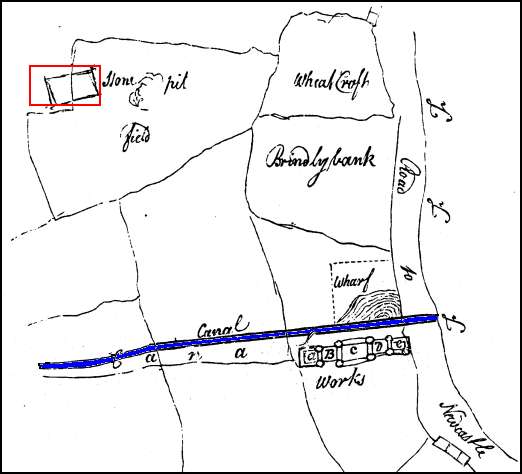Etruria: Etruria and Josiah
Wedgwood![]()
![]() (1760 onwards)
(1760 onwards)
Introduction to the walk
These notes have been produced for a history walk around Etruria.
The purpose of the walk is to show how the different elements of the estate were created by Josiah Wedgwood, pottery manufacturer, in the l8th century and the subsequent transformation of the area in the following century.

Ridge
House Estate
The map above shows part of the Ridge House Estate bought by Josiah Wedgwood from Mrs Ashenhurst for £3000 in 1767.
The line of the new Trent and Mersey Canal has been drawn across the existing fields (which was not completed until 1777).
Below this the new factory is shown arranged around a series of courtyards next to the turnpike road to Newcastle-under-Lyme. On the other side of the canal in Stone pit field is the site of Etruria Hall (shown in red).
Shortly after this map was drawn Josiah Wedgwood purchased land on the other side of the turnpike road from Mr Egerton thus creating a compact estate of about 250 acres on the East side of the Fowlea Valley.
J Allbut, described the new estate in the Staffordshire Pottery Directory, 1802, as follows:
"Etruria is situated on the turn-pike road leading from Cobridge to Newcastle. It belongs solely to Josiah Wedgwood, Esq. who has here a very extensive earthenware manufactory, a handsome seat, and complete grounds.
His manufactory is built with great taste, and admirably disposed for the business for which it is designed, in a beautiful valley by the side of the Grand Trunk Canal, which is here purposely widened, and forms a fine sheet of water. From the side of the canal, opposite the works, on an eminence stands the dwelling house which commands a charming prospect of the vale below; through which the canal, in many windings, carries through the kingdom the productions of various countries.
The view closes by Harecastle, and the hills which separate Staffordshire from Cheshire. The name of this place was given to it by Mr Wedgwood, in memory of an ancient state in Italy, once celebrated for the exquisite taste of its Pottery; the remaining specimens of which have served greatly to improve the beauty of the modern articles. Near the manufactory is the village; built by Mr Wedgwood, for the accommodation of his workmen, who chiefly reside here. It forms a neat and regular street, about the middle of which is a free school, where the children resident in Etruria and its vicinity are educated in the rudiments of useful knowledge.”
Next starts the tour at Wedgwood's home: Etruria Hall
questions/comments/contributions? email: Steve Birks